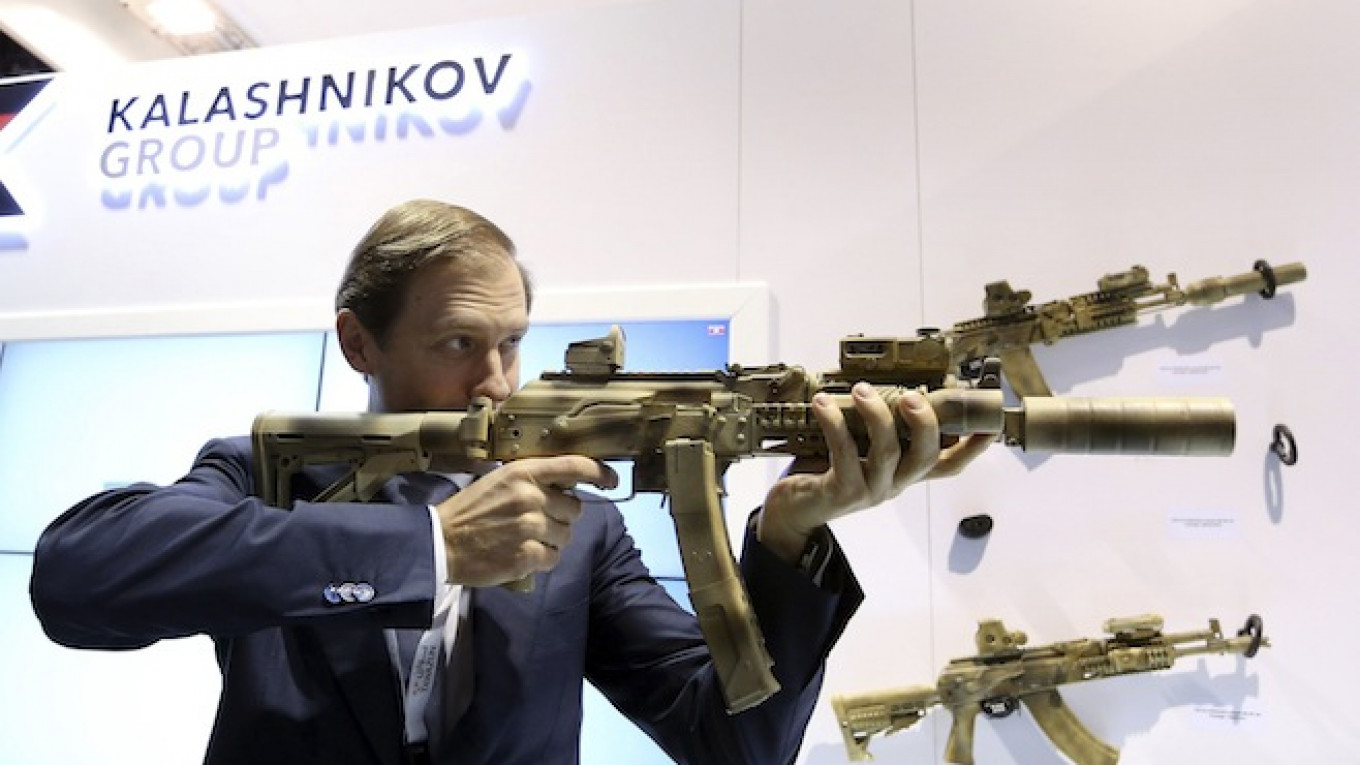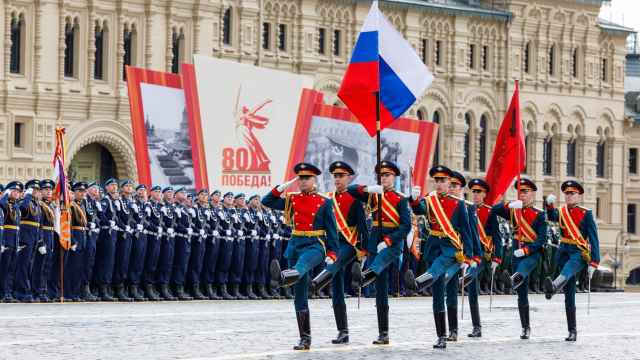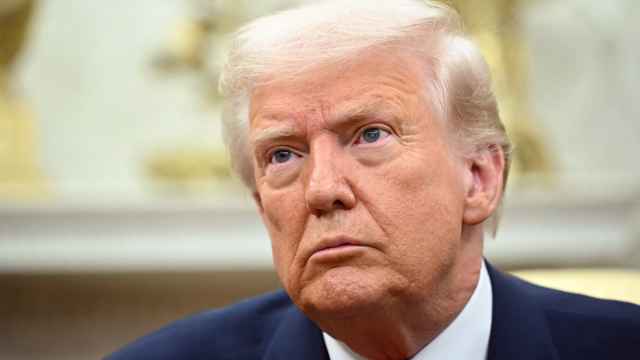Russian arms export deliveries reached a record $10 billion last year, but declining oil prices and Western sanctions threaten to derail the country's ongoing expansion in the arms market, according to a report on the international defense industry released Sunday.
Russia, the world's second-largest defense exporter after the United States, saw a 9 percent rise in exports last year compared to 2013, according to data collected by industry analysts IHS.
Russia's official numbers for its exports last year are slightly higher, coming in at $13 billion, continuing a decade-long upward trend. But IHS excludes small arms sales, focusing on larger equipment and the actual value of hardware delivered to customers. It also includes only final products, ignoring subcomponents used in construction of equipment.
Russia lagged behind last year's massive 13.4 percent growth in the global defense industry, which was driven by “unparalleled demand from the emerging economies for military aircraft and an escalation of regional tensions in the Middle East and Asia Pacific,” IHS senior analyst Ben Moores was quoted in a company statement as saying.
Russian exports were geared heavily toward fixed-wing aircraft and helicopters, which respectively made up $4.4 and $2.2 billion of Russia's total exports, Moores told The Moscow Times in a follow-up e-mail.
Russia's state-owned United Aircraft Corporation (UAC) and Russian Helicopters defended their places in the world's top-10 defense export firms, and Russian Helicopters was the world's single largest helicopter exporter last year. United Shipbuilding Corporation, another state company, was the world's largest exporter of ship hulls, exporting $900 million worth of submarines and $400 million worth of surface vessels last year, Moores said.
But the good times could end this year. “Russian industry exports now face challenging times. A drop-off in [Russian] exports is forecast for 2015 as major programs draw to a close, a trend that could be accelerated by sanctions,” the IHS statement said.
Major aircraft and helicopter delivery programs to Mexico, China, Afghanistan, Venezuela and Yemen ended last year, Moores said, predicting that export deliveries would fall 7 percent to $9.3 billion this year.
Russia's largest armored vehicle maker, UralVagonZavod, meanwhile, “continues to see its share of the world vehicle market decline and has one of the weakest export backlogs for vehicles globally,” Moores added.
But the figures won't ruffle feathers in Moscow, where analysts had expected exports to plateau, said Ruslan Pukhov, director of Russian defense think tank the Center for the Analysis of Strategies and Technologies (CAST).
Looming Troubles?
Even if military exports were expected to stall, the timing is inconvenient. Russia's economy is expected contract sharply this year as low oil prices and Western sanctions over Ukraine starve the country of income. State expenditure is facing significant cutbacks, though defense spending has been largely preserved.
“In a time of economic crisis and sequestration of the military budget, export contracts are extremely important,” Pukhov said, adding that Russian firms charge their foreign customers up to two and a half times more than the Defense Ministry pays.
Although Western sanctions have cut off Russian defense companies from European and North American markets, its largest trade partners last year were non-Western nations that have histories or vested interests in buying Russian equipment.
“The weapons trade is much less business than it is foreign policy,” said Pukhov. “A resurgent Russia facing down the U.S. has become extremely popular in many countries and they are buying from Russia because of Putin's [popularity],” he said.
Russia's largest export partner was China, to which it delivered $2.3 billion of equipment, according to IHS. India received $1.7 billion of Russian arms last year, while Venezuela and Vietnam received $1 billion each.
But Russia's hold over these nations isn't guaranteed, as their own domestic agendas and spending priorities may lead them to curtail orders of Russian equipment.
According to Siemon Wezeman of the Stockholm International Peace Research Institute (SIPRI), India will play a major role in the long-term fate of Russian defense exports as it decides from whom to purchase more fighter jets, transport aircraft and even submarines.
“If India goes for a Russian solution, then Russia's exports do well. If not, Russia is in trouble,” Wezeman said.
Beyond India, IHS predicted that the near 50 percent fall in the price of oil since last summer will impact Russia's arms exports in 2015 by curtailing orders from oil-dependent customers such as Venezuela and Iran.
China's move away from its historical dependence on Russian defense technology toward homegrown equipment will also hit sales, the IHS report said. Beijing has made a push to build its own aircraft, air defense systems and submarines, but still has yet to completely cut the cord with Russia.
Exports have also been complicated by a Western arms embargo imposed as part of sanctions against Moscow last year. Western electronics and weapons are used in export versions of major Russian hardware, such as fighter jets, and delays arising from import substitution could lead to lost orders.
Luckily for the Russian defense industry, the government is bankrolling a massive rearmament effort that has so far escaped state spending cuts. This year alone, military expenditures are expected to set a record high of 3.3 trillion rubles ($54.5 billion), and “a very substantial part of that increase is specifically for buying equipment, probably enough to cover any reductions in exports,” Wezeman said.
But if Russia's economic troubles worsen, “the quickest and easiest cuts are in procurement. Then reduced exports and reduced national orders are going to hit really hard on the Russian industry,” he said.
Contact the author at [email protected]
A Message from The Moscow Times:
Dear readers,
We are facing unprecedented challenges. Russia's Prosecutor General's Office has designated The Moscow Times as an "undesirable" organization, criminalizing our work and putting our staff at risk of prosecution. This follows our earlier unjust labeling as a "foreign agent."
These actions are direct attempts to silence independent journalism in Russia. The authorities claim our work "discredits the decisions of the Russian leadership." We see things differently: we strive to provide accurate, unbiased reporting on Russia.
We, the journalists of The Moscow Times, refuse to be silenced. But to continue our work, we need your help.
Your support, no matter how small, makes a world of difference. If you can, please support us monthly starting from just $2. It's quick to set up, and every contribution makes a significant impact.
By supporting The Moscow Times, you're defending open, independent journalism in the face of repression. Thank you for standing with us.
Remind me later.






